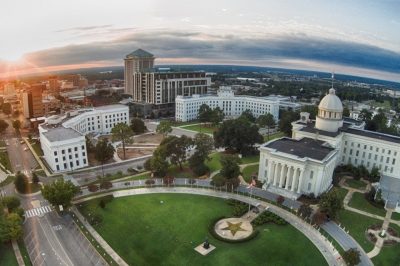 Lately, Alabama has been one of the US states with the most concentrated efforts to expand the local gambling sector.
Lately, Alabama has been one of the US states with the most concentrated efforts to expand the local gambling sector.
However, it has not been easy for state lawmakers to find one solution for the situation because of some issues. The belief that all gambling is pretty much the same and has to be addressed by one piece of legislation has been among the major problems that have been delaying the process.
There are three major directions for further gambling expansion in the state, including class III or casino-style gaming, a lottery, and sports betting. According to experts, the combination of the three would be a powerful political tool to push through bad policies with some that have been more popular. The thing is that each of the three gambling expansion issues is likely to draw enough support to become law individually but the details and engagement in long and complicated political disputes have made things difficult.
As CasinoGamesPro has previously reported, the debate on a proposed constitutional amendment that seeks to legalize casino gambling, lotteries and sports betting in the state of Alabama has been put on hold in the Senate.
The sponsor of the proposed amendment, Senator Del Marsh, shared that he wanted to do more on the enabling piece of legislation before the debate on the amendment in the local Senate takes place. He is seeking to enable the bill, as such a move would bring more information on how the gambling expansion in Alabama would work in case state voters give their approval to the constitutional amendment.
Senator Del Marsh’s Bill Seeks to Legalize Casino Gambling, Lotteries and Sports Betting
 Senator Del Marsh introduced his plan on February 11th, with Alabama Senate debating the proposal briefly on the same day. Almost two weeks later, the legislation sponsor hoped for the debate to resume, possibly with a vote, but unfortunately, plans changed and the discussions were delayed.
Senator Del Marsh introduced his plan on February 11th, with Alabama Senate debating the proposal briefly on the same day. Almost two weeks later, the legislation sponsor hoped for the debate to resume, possibly with a vote, but unfortunately, plans changed and the discussions were delayed.
As CasinoGamesPro reported, if approved by local lawmakers and voters, the piece of legislation of Senator Del Marsh would allow five new casino venues to offer the full range of gambling services and would establish the Alabama Education Lottery. Furthermore, the bill seeks to authorize both land-based and online sports betting.
For now, constitutional amendments require three-fifths of local senators and representatives to give their approval in order for the measure to go on the ballot for local voters. This would mean a “yes” vote from 21 of the 34 senators in order for the bill to be sent to the Alabama House.
As previously revealed, the bill seeks to allow the state’s four greyhound tracks to host a casino, with the fifth casino venue set to be established in DeKalb County or Jackson County and would be run by the Poarch Band of Creek Indians. All casinos would pay a license fee to the state, along with a 20% tax on their gambling revenue, with the proceeds set to be used to fund health and mental health care, broadband Internet access expansion and other programs in Alabama, including the state General Fund.
On the other hand, the net revenue of the proposed Alabama Education Lottery is set to be used for providing funding for community college programs and college scholarships. The lottery would offer some games available in other US states, such as Mega Millions and Powerball, as well as instant tickets.
Casino Gambling Remains a Highly-Controversial Issue
 For years, the state of Alabama and some gambling operators have been trying to find a compromise on which gambling services are legal. Slot machine look-alikes have probably been the most controversial topic so far.
For years, the state of Alabama and some gambling operators have been trying to find a compromise on which gambling services are legal. Slot machine look-alikes have probably been the most controversial topic so far.
Currently, charitable bingo is legal in the state, and gambling companies have long argued that they are offering electronic bingo games in a format that hardly has any differences with illegal slot machines. The issue has fuelled debates that have been so fierce that the Alabama Supreme Court issued a specific definition of “bingo”.
On the other hand, casino-style gambling has also been a controversial topic in some states across the US. Currently, about 50% of US states officially permit some form of commercial casino-style gambling, while a few more states offer such gambling only in tribal gambling venues.
The legalization of casino-style gambling and the establishment of fully-functioning casino venues could be extremely profitable for the state, especially in case the state’s Government eliminates potential competition. As mentioned above, the bill of Senator Del Marsh encourages Governor Kay Ivey to enter a compact with the Poarch Band of Creek Indians, meaning that the Native American tribe could be granted a monopoly on casino gambling in Alabama. This is where politics gets involved in the game because the process for limited casino operator licenses should be competitive. If not, this would mean that state legislators would pick the operators that would draw benefit from the licenses.
Alabama Legislature Should Find a Solution for Lottery and Sports Betting Legalization Issues
 The state’s Governance has still not agreed on the controversial matters associated with a state-run lottery, too.
The state’s Governance has still not agreed on the controversial matters associated with a state-run lottery, too.
If Alabama’s legislature decides to make an effort and legalize lottery tickets, it should take the establishment of private lotteries into account, as well as the taxation issues associated with them. Despite it is now much easier to regulate lottery gambling, there are still social harms associated with the process.
According to estimates provided by the Legislative Services Agency, the revenue that could be raised for the state of Alabama by lottery and casinos is between $450 million and $670 million.
Apart from casino gambling and lotteries, sports betting is the third issue that is associated with the proposed bill of Senator Del Marsh. According to some of probably the worst legislative solution that state politics has produced for some time. The ones who have opposed such a clause believe there is no reason to require local customers to be physically present at a retail gambling venue in order to place a bet on a sporting event. The proponents of the provision, however, have been arguing that such a requirement would reduce problem gambling that could quickly rise to considerable levels in case online sportsbooks were allowed.